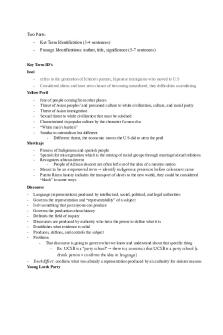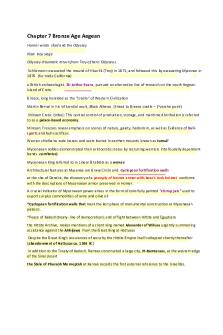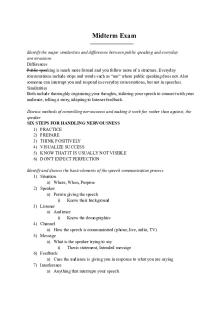CMLT Mid-Term Paper 1 - Professor Meltem PDF

| Title | CMLT Mid-Term Paper 1 - Professor Meltem |
|---|---|
| Course | Comparative Ethnic Amer Lit |
| Institution | University of Georgia |
| Pages | 6 |
| File Size | 84 KB |
| File Type | |
| Total Downloads | 13 |
| Total Views | 129 |
Summary
Professor Meltem...
Description
Professor Meltem Şafak CMLT 2500 12 February 2020
Traveling Through an Identity Crisis Cultural identity is defined as “the sense of belonging towards a culture (Cultural Identity).” So what if your culture is not defined among the constraints of location or religion, but is a culmination of all of the places you have lived and learned? Then whose culture do you belong to? Is one expected to assume the cultural identity of what society expects them to or define for themselves their own identity based on all of the cultures they have experienced and accepted? The truth is that identity is never a set definition, but it is constantly changing based on one’s life experiences. Stuart Hall describes cultural identity as a combination of origin and livelihood that is “not a fixed essence but a positioning in time (226).” He says that,“cultural identities are points of identification...which are made, within the discourses of history and culture (Hall 226).” Through our class this semester, we have collectively examined many literature works that concern cultural identity and issues of displacement and double consciousness. The theme of cultural identity was especially apparent in Travelers by Helon Habila that tells the story of a narrator whose identity changes from the beginning to the end of the novel. This change is a result of his experiences in Europe with exiles suffering from similar cases of identity crisis in a foreign country. Habila uses his novel as a vessel to bring exposure to the issue of displacement and suffering of exiles in modern day. The main theme in Travelers concerns changing identity. Habila achieves this mainly through the main character, the narrator, who remains nameless throughout the entire novel. As
the reader, I assumed no name is ever given in order for the narrator to not have a stereotype, enabling him to tell the story of the travelers he meets from an unbiased point of view. For this reason, Habila very much makes it known throughout the novel that names can either empower us or bring us down. However, as the novel progresses, the reader can see that the narrator’s character was used as a big tool in supporting the theme of cultural identity. The narrator is a Nigerian-born graduate student who lives a fairly good life in America with a successful wife and a job. He suffers from imposter syndrome in his everyday life and cannot seem to ever be truly satisfied with his current situation. This changes when his wife, Gina, asks him to travel to Germany with her for an art fellowship, and after she finishes her project, he decides not to go back with her to America. Instead, he travels throughout Europe while meeting displaced individuals and learning their stories, and even experiencing for himself being a refugee. Each story he hears makes an impact on him and brings him closer to the experience of being stateless, like most of the exiles he meets. Whether the narrator is looking to find himself, is just simply trying to have real experience to finish his pHd, or is searching for something much deeper, is unclear. The first character our narrator meets is Mark, who was a student turned asylum seeker who left his own country, Malawian, because of segregation for being transgender. After growing up as Mary with a father who never supported his true self, Mark ran off to Europe and faked his death so he could leave his past self and memories behind. With Mark’s story, the second example of the significance of names in terms of identity is evident. Also, the reader sees the emergence of the narrator trying to identify with Mark by going to resistance rallies with him and his friends and even taking care of him after he should have been deported. After Mark dies in the refugee camp in Berlin, our narrator is deeply affected, which causes him to lose himself a
little bit more, and he decides to stay in Europe instead of going home with his wife, Gina, to the United States. I think Habila used Book One to set the scene for the rest of the novel and prepare the reader for the narrator’s interactions with the other characters. Throughout the next few books, the narrator meets three people who are struggling in Europe. The first is Manu, an asylum seeker, who cannot seem to move on with his life after his wife and child were lost at sea. The second is Portia, whose father and brother’s deaths rooted from an identity crisis in their native country, Africa. The third is Karim who is trying, without much success, to get his children and wife to safety after living on the run for years from a powerful group in his home country, Somalia. Following these encounters, the narrator coincidentally mistakes Karim’s bag for his, losing his papers to travel and his immunity in Europe. He mistakenly gets on the wrong train that is headed for a refugee camp in Italy, where he has to embrace becoming a refugee after many failed attempts to prove he is not exiled. I see this as the turning point for the narrator because the camp caused him to suffer and interact with the immigrants on a more personal level. Matteo, a volunteer at the camp, nurses him back to health in which he tells him about the story of Sophia, a sea-stricken woman he tricked into marrying him, who ended up being Basma, Manu’s long-lost wife. Basma’s story is the third example of the significance of names in the novel. I think experiencing the Italy refugee camp and hearing Basma’s story for himself made everything the narrator had been discovering become real, for the first time since Mark’s death, which affected him so much he felt the need to go back home to Zambia. By the end of the novel, our narrator’s journeys have affected him in a big way. Instead of jumping to learn from and assist refugees when he traveled back to Europe, as he was at the beginning of the story, he seems very apprehensive to help the last traveler he meets, Juma, who
is the first example in the book of a true refugee. He ultimately only agrees to help Juma because the woman he loves, Portia, wants to help him. From the reader’s point of view, I think he did not want to take the risk of assisting a refugee because over the past few years he has constantly been living like a refugee. One could assume he accomplished his original mission of experiencing being displaced, whatever that experience’s purpose was in his life: possibly to finish his pHd or find what he was looking for in himself. I think he was wary of getting involved with this again after the turning point at the refugee camp with other immigrants where he almost let himself go to the point of death. Nationalism is also a huge theme throughout the book that is a big cause of the issue of cultural identity. As the reader, I think Habila’s goal through this theme, in collaboration with other issues, was to create awareness, not only about the refugee crisis, but also about how Europe has been failing to fix or truly aid the problem in any way. Throughout the story, there are countless examples of the abuse of power by nations. Some examples of these can be seen by the unfair treatment of Karim and his family at the Bulgarian prison, Mark being killed by the police in Berlin, the resistance Juma received by Germany when seeking asylum, and how the states of Africa do not communicate or support each other in times of need. The travelers in the novel try to find new routines among the ever changing reality of their lives in the European nations, who do not want to integrate them but also do not want to help them. Identity crisis is a real problem in Europe and in our world today. So what is the fix? Do we try to fix the situation in the exiles’ countries? Where do we put these exiled people who have rights, lives, family, and friends? Is it better to keep the displaced people in their home country or in undernourished refugee camps miles away? Most of the refugee camps in Europe lack resources that many refugees need, and I think the center of the issue is that there are many
countries with resources to help these people who just simply put are not helping at all. All aspects of the novel, Travelers, assists the overarching issue of displacement and cultural identity. Our identities are shaped by our background and change based on our experiences, like the narrator and the exiled people he met during his journeys. Habila used his novel to convey to his audience the severity of the refugee crisis in our world today and convince the reader that helping these people is not done by ignoring the issue and leaving it for other nations to handle. If nations, like the United States, do not take action, the issue of displacement and identity will continue to plague these individuals. After all,“there is no loneliness like the loneliness of a stranger in a strange city (Habila).”
Works Cited “Cultural Identity.” Cleverism, 20 Dec. 2017, www.cleverism.com/lexicon/cultural-identity/. Habila, Helon. Travelers: A Novel. W.W. Norton Et Company, 2019. Hall, Stuart. Cultural Identity and Diaspora: Identity: Community, Culture, Difference. Edited by Jonathan Rutherford, London: Lawrence and Wishart, 1990. ....
Similar Free PDFs

Midterm-paper 1 sample-question
- 10 Pages

Riassunti paper professor Cucco
- 15 Pages

Theory paper - Professor Kresse
- 2 Pages

Midterm Paper - ESC1200ID
- 6 Pages

Midterm paper - Grade: A
- 7 Pages

ENGL 50 Midterm - Professor Black
- 10 Pages

Midterm Paper HRM 101 HRM
- 5 Pages

FTV Midterm Paper - Grade: B
- 6 Pages
Popular Institutions
- Tinajero National High School - Annex
- Politeknik Caltex Riau
- Yokohama City University
- SGT University
- University of Al-Qadisiyah
- Divine Word College of Vigan
- Techniek College Rotterdam
- Universidade de Santiago
- Universiti Teknologi MARA Cawangan Johor Kampus Pasir Gudang
- Poltekkes Kemenkes Yogyakarta
- Baguio City National High School
- Colegio san marcos
- preparatoria uno
- Centro de Bachillerato Tecnológico Industrial y de Servicios No. 107
- Dalian Maritime University
- Quang Trung Secondary School
- Colegio Tecnológico en Informática
- Corporación Regional de Educación Superior
- Grupo CEDVA
- Dar Al Uloom University
- Centro de Estudios Preuniversitarios de la Universidad Nacional de Ingeniería
- 上智大学
- Aakash International School, Nuna Majara
- San Felipe Neri Catholic School
- Kang Chiao International School - New Taipei City
- Misamis Occidental National High School
- Institución Educativa Escuela Normal Juan Ladrilleros
- Kolehiyo ng Pantukan
- Batanes State College
- Instituto Continental
- Sekolah Menengah Kejuruan Kesehatan Kaltara (Tarakan)
- Colegio de La Inmaculada Concepcion - Cebu







